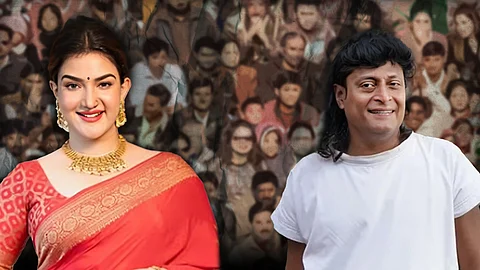

When a woman files a complaint against a man like businessman Boby Chemmanur, who has made crass sexual humour his brand, one would expect to see unanimous support for her. But in ‘progressive’ Kerala, actor Honey Rose has triggered a backlash. Several people expressed solidarity with her, but she also opened a can of extremely sexist worms—many argue that Honey Rose voluntarily sexualises herself through her choice of dressing and that Boby was only piggybacking on this.
Le temps viendra—a French phrase meaning "the time will come"—reads actor Honey Rose’s Instagram bio. Over the last few years, Honey has built a teeming fanbase extending beyond her 4.3 million online followers, with people thronging to glimpse her at inaugurations and public events. But unlike her male counterparts, her fanbase is not a homogenous crowd that cheers for her. She has been at the receiving end of misogynistic hate, body shaming, and moral policing, exposing the Malayali hypocrisy that leers at her in private and chastises her in public. All through this, Honey has maintained her calm with her signature smile plastered on her face, until recently, when Boby Chemmanur made multiple innuendos about her body.
Boby’s remarks became a talking point on social media, but nothing stopped him from making more sexist comments about Honey at public events. This also led to people massively cyberbullying her, making invasive comments and rape jokes about her body. Honey declared that the time has truly come to take on the sexist entitlement that follows women’s bodies everywhere. “I declare war on behalf of every woman who goes through such harassment,” she wrote.
Rahul Easwar, who has almost made a career out of whitewashing powerful men accused of sexual misconduct, said that those who applaud Honey must also agree that her styling has made many uncomfortable for its lack of ‘modesty’. He also repeatedly quoted actor Fara Shibla, who wrote that women like Honey are capitalising on sexual depravity and the male gaze by dressing voluptuously and cultivating an audience out of it. Many also pointed out that even in her films, Honey is sexualised, and her presence is limited to her sexual appeal.
While people are entitled to have their opinions about whether or not a woman is objectifying herself by dressing a certain way, can that become an excuse to allow harassment against her? The answer, of course, is a resounding ‘no’. What Rahul and those who support him are trying to do here is chastise the woman instead of holding the perpetrator accountable.
In fact, let's take it a bit further. One can have disagreements with the way Honey Rose dresses or her body politics, and it can be debated at any time in a respectful manner. But this is not the time to conflate the two. Casting a shadow of moral ambiguity over a woman at such a juncture is not just deflective but also telling of how hypocritical we remain beneath all that hard shell of being literate, political, and progressive.
Whether Honey Rose’s public persona panders to the male gaze or not is a different, unrelated debate. How she is presented in films is also a sum total of quite many factors, some of which are economic choices made by the very same men we revere. It is simply not appropriate to conflate that with her choice to take on a man who has insulted her on public platforms.
In a patriarchal society, this line of rape apology is a popular vehicle to discredit women because everybody loves moral policing, particularly when the woman in question is an actor. Her body is considered public property, and anytime she questions invasive comments, the response is that she ‘brought it on herself’ by putting herself on a public platform. Every time a female actor uploads images from a photoshoot or personal pictures of them on social media, a good number of comments are directed at their bodies, asking them to either cover up or be accepting of ‘consequences’ like sexual abuse.
This is not only reflective of the entitlement over women’s bodies but also how they are seen as the repositories of a patriarchal society’s ‘sense of honour’. It goes on to emphasise that a woman must be a ‘perfect victim’ to complain against a man or to raise any kind of dissenting opinion. Otherwise, it comes back like a boomerang, triggering scrutiny of everything about her, from clothes to personal choices—a mob trial that men are seldom subjected to, no matter what heinous crime they are accused of.
Moreover, it is exhausting to have to drive home the fact that no matter how a woman decides to position herself, her right to bodily autonomy and safety cannot be denied.
Views expressed here are the author's own.